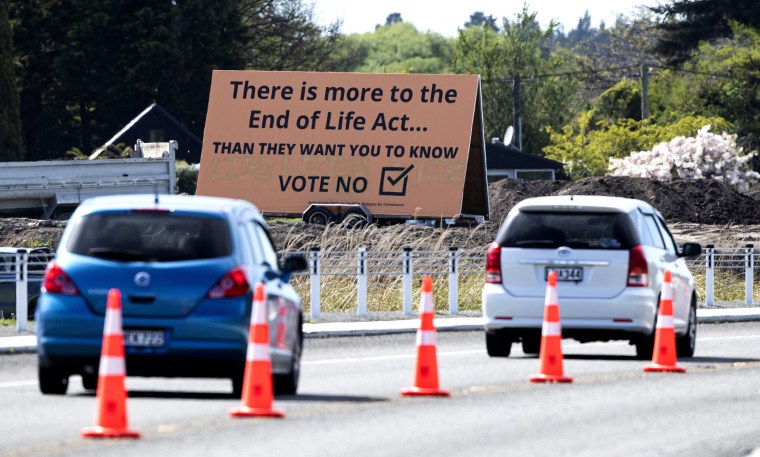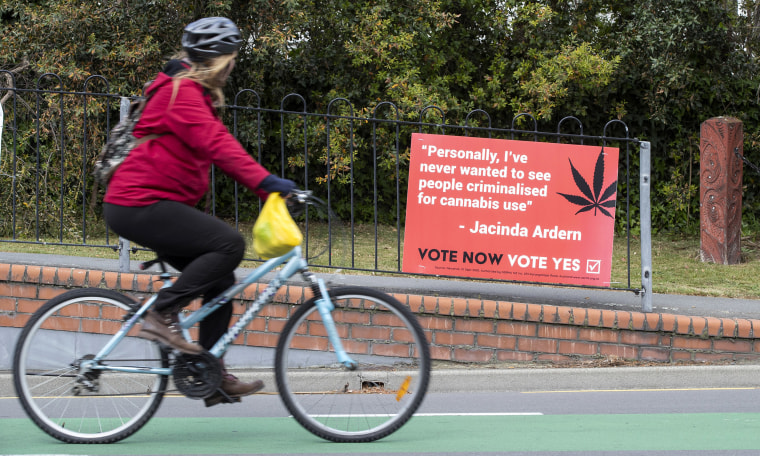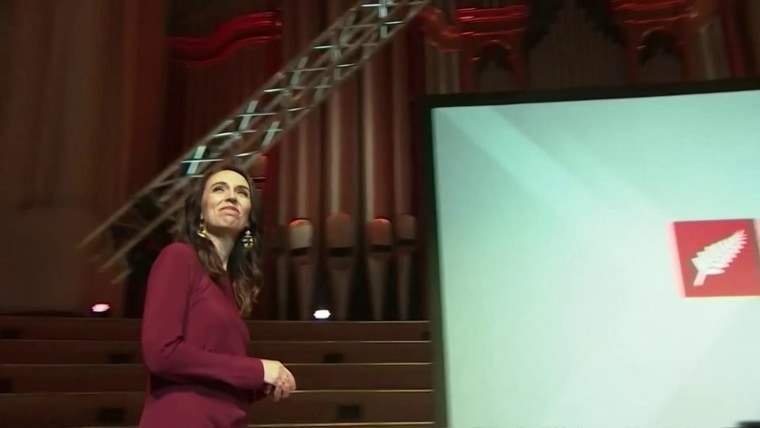NOT SO FAST VOTES ARE STILL COMING IN
Prime Minister Jacinda Ardern said Friday after the results were released that she had voted in favor of both referendums.

The two referendums represented significant potential changes to New Zealand's social fabric, although the campaigns for each ended up being overshadowed by the coronavirus pandemic and a parallel political race, in which Prime Minister Jacinda Ardern and her liberal Labour Party won a second term in a landslide. OCT. 19, 202002:08
OCT. 19, 202002:08
In past elections, special votes — which include those cast by overseas voters — have tended to track more liberal than general votes, giving proponents of marijuana legalization some hope the measure could still pass.
Proponents of legalizing the drug were frustrated that Ardern wouldn't reveal how she intended to vote ahead the Oct. 17 ballot. Many believed an endorsement by Ardern could have boosted support for the measure, but she said she wanted to leave the decision to New Zealanders.
Ardern said Friday, after the results were released, that she had voted in favor of both referendums.
Conservative lawmaker Nick Smith, from the opposition National Party, welcomed the preliminary marijuana result.
"This is a victory for common sense. Research shows cannabis causes mental health problems, reduced motivation and educational achievement, and increased road and workplace deaths," he said.
But liberal lawmaker Chlöe Swarbrick, from the Green Party, said they had long assumed the vote would be close and they needed to wait until the special votes were counted.
"We have said from the outset that this would always come down to voter turnout. We've had record numbers of special votes, so I remain optimistic," she said. "New Zealand has had a really mature and ever-evolving conversation about drug laws in this country and we’ve come really far in the last three years."
Proponents had argued the measure would reduce profits for gangs and improve social outcomes for indigenous Maori.


New Zealanders voted to legalize euthanasia in a binding referendum, results released Friday showed. Mark Baker / AP
Oct. 30, 2020, 3:53 AM MDT
By The Associated Press
WELLINGTON, New Zealand — New Zealanders voted to legalize euthanasia in a binding referendum, but preliminary results released Friday showed they would likely not legalize recreational marijuana use.
Oct. 30, 2020, 3:53 AM MDT
By The Associated Press
WELLINGTON, New Zealand — New Zealanders voted to legalize euthanasia in a binding referendum, but preliminary results released Friday showed they would likely not legalize recreational marijuana use.
With about 83 percent of votes counted, New Zealanders emphatically endorsed the euthanasia measure with 65 percent voting in favor and 34 percent voting against.The "No" vote on marijuana was much closer, with 53 percent voting against legalizing the drug for recreational use and 46 percent voting in favor. That left open a slight chance the measure could still pass once all special votes were counted next week, although it would require a huge swing.
The two referendums represented significant potential changes to New Zealand's social fabric, although the campaigns for each ended up being overshadowed by the coronavirus pandemic and a parallel political race, in which Prime Minister Jacinda Ardern and her liberal Labour Party won a second term in a landslide.
 OCT. 19, 202002:08
OCT. 19, 202002:08In past elections, special votes — which include those cast by overseas voters — have tended to track more liberal than general votes, giving proponents of marijuana legalization some hope the measure could still pass.
Proponents of legalizing the drug were frustrated that Ardern wouldn't reveal how she intended to vote ahead the Oct. 17 ballot. Many believed an endorsement by Ardern could have boosted support for the measure, but she said she wanted to leave the decision to New Zealanders.
Ardern said Friday, after the results were released, that she had voted in favor of both referendums.
Conservative lawmaker Nick Smith, from the opposition National Party, welcomed the preliminary marijuana result.
"This is a victory for common sense. Research shows cannabis causes mental health problems, reduced motivation and educational achievement, and increased road and workplace deaths," he said.
But liberal lawmaker Chlöe Swarbrick, from the Green Party, said they had long assumed the vote would be close and they needed to wait until the special votes were counted.
"We have said from the outset that this would always come down to voter turnout. We've had record numbers of special votes, so I remain optimistic," she said. "New Zealand has had a really mature and ever-evolving conversation about drug laws in this country and we’ve come really far in the last three years."
Proponents had argued the measure would reduce profits for gangs and improve social outcomes for indigenous Maori.

A cyclist rides past a sign in support of making marijuana legal in Christchurch, New Zealand. Preliminary results on Friday showed it was unlikely the measure would pass. Mark Baker / AP
The marijuana measure would allow people to buy up to 14 grams (0.5 ounce) a day and grow two plants.
Other countries that have legalized or decriminalized recreational marijuana include Canada, South Africa, Uruguay, Georgia plus a number of U.S. states.
The euthanasia measure, which would also allow assisted suicide and takes effect in November 2021, would apply to adults who have terminal illnesses, are likely to die within six months, and are enduring "unbearable" suffering.
Other countries that allow some form of euthanasia include the Netherlands, Luxembourg, Canada, Belgium and Colombia.
The marijuana measure would allow people to buy up to 14 grams (0.5 ounce) a day and grow two plants.
Other countries that have legalized or decriminalized recreational marijuana include Canada, South Africa, Uruguay, Georgia plus a number of U.S. states.
The euthanasia measure, which would also allow assisted suicide and takes effect in November 2021, would apply to adults who have terminal illnesses, are likely to die within six months, and are enduring "unbearable" suffering.
Other countries that allow some form of euthanasia include the Netherlands, Luxembourg, Canada, Belgium and Colombia.

No comments:
Post a Comment